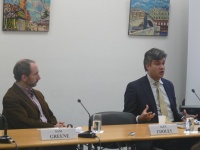Registration
You will receive an email confirming your registration.
IMGXYZ2966IMGZYXThe Shanghai Cooperation Organization (SCO) was founded in 2001 by China, Russia, Kazakhstan, Kyrgyzstan, Tajikistan, and Uzbekistan, but the nature of the organization and its role remain somewhat unclear. Alexander Cooley of Barnard College at Columbia University spoke about the SCO as well as his upcoming book, Great Games, Local Rules: US-Russia-China Competition in Central Asia, at an event hosted by the Carnegie Moscow Center. Carnegie’s Sam Greene moderated.
What Is the Shanghai Cooperation Organization?
The SCO—whose Secretariat is based in Beijing—was formally established in 2001 with the mission of establishing a new type of international relations. Cooley presented three distinct perceptions that shape the West’s view of the SCO and its global role:
- Anti-Western Bloc: Initially, the West perceived the SCO as a new Sino-Russian alliance intended to push the West out of Central Asia or to diplomatically limit U.S. influence in the region. Cooley explained that after the Georgian war of 2008, the West began to question whose security agenda the SCO was really backing, as the SCO refused to support Russia’s push for recognition of Abkhazia and South Ossetia. In contrast, the SCO immediately supported China’s crackdown on the Urumqi riots in 2009.
- Authoritarian club: Other Westerners, particularly human rights advocates, see the SCO as promoting anti-democratic values and authoritarianism within the region. They perceive the SCO as opposed to Western liberal values, embodying sovereign non-interference in the domestic affairs of countries, condoning political repression, and privileging state power over civil society. This perception is partially due to the SCO’s stated goal of combating what it describes as the “three evils of the region”: separatism, terrorism, and extremism. Many in the West believe this effort has led to significant human rights violations.
- Regional public goods provider: One final way the West could view the SCO is as an organization that facilitates regional integration of common economic projects and helps with badly needed regional infrastructure development. Cooley argued that the SCO has not played this role so far. He suggested that the SCO is prevented from this kind of facilitation for two potential reasons: first, because China and Russia have been following their own economic agendas, and second, because of the prohibitively high informal barriers to trade in Central Asia, such as institutionalized corruption.
Important Western Institutions and the SCO
- The European Union: The EU has mixed views of the SCO, Cooley said. Although the EU supports the public goods and regional integration dimension of the SCO, it is disappointed with the organization’s lack of progress on trade infrastructure and economic development. The EU also takes issue with the SCO’s negative view of separatism, as the EU, unlike the SCO, does not necessarily see nationalist movements as a negative phenomenon.
- NATO: NATO was very concerned by the SCO’s hardline attitude toward Western countries in 2005-2006. According to Cooley, however, NATO’s attitude toward the SCO has since changed, and NATO is increasingly open to considering cooperation with the SCO, especially on the issue of Afghanistan. It also sees the SCO’s potential to enhance the sovereignty of Central Asian states and, Cooley added, believes that dealing with the SCO is preferable to dealing with the Collective Security Treaty Organization (CSTO).
Cooley concluded that the SCO’s global role and reputation is still in flux. Western international organizations will respond to the SCO according to their different priorities, Cooley said. As a result, he added that the EU seems to be leaning against engagement with the SCO, while NATO and the United States are more inclined toward cooperation.
